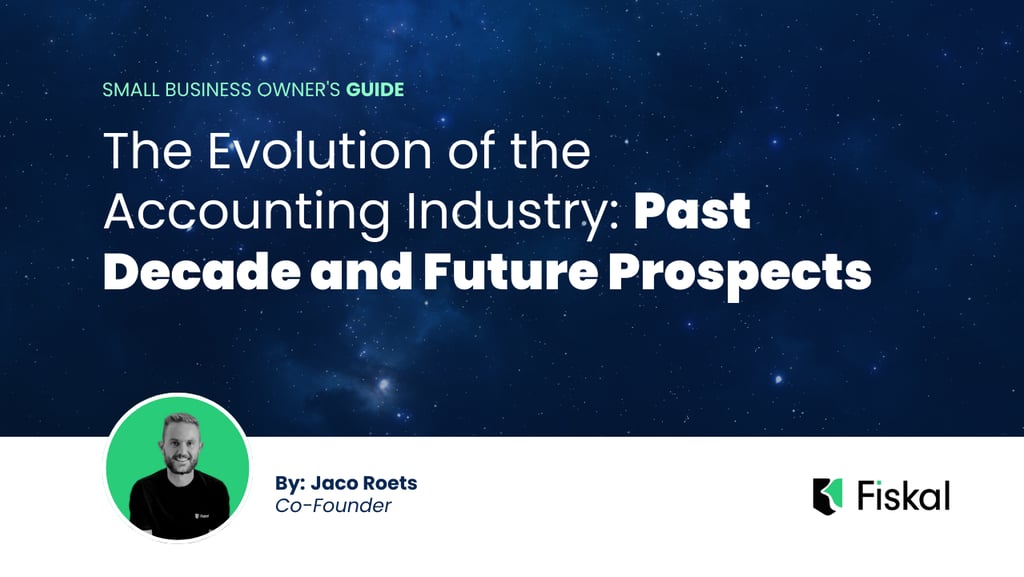The Evolution of the Accounting Industry: Past Decade and Future Prospects
The accounting industry has undergone significant transformation over the past decade, driven by advancements in technology, regulatory changes and shifting client expectations. As we look forward to the next ten years, the pace of change is expected to accelerate, with new innovations and challenges shaping the future of the profession. This blog post explores the key changes in the accounting industry over the past ten years and anticipates the trends that will define the next decade.
SYSTEMS AND SOFTWARE


The Last 10 Years: Key Changes in the Accounting Industry
Technological Advancements Over the past decade, technology has revolutionized the accounting industry. Cloud computing has become mainstream, enabling accountants to access financial data from anywhere, at any time. Accounting software such as QuickBooks, Xero and Sage has evolved, offering more robust features and integrations that streamline bookkeeping, payroll and tax preparation processes. Automation has also played a significant role, reducing the time spent on repetitive tasks and increasing accuracy.
Rise of Data Analytics The use of data analytics in accounting has grown substantially. Accountants now leverage data analytics to gain insights into financial performance, identify trends and make more informed decisions. Predictive analytics has also emerged, allowing firms to forecast future financial outcomes and advise clients on strategic planning.
Regulatory Changes The accounting industry has faced numerous regulatory changes over the past decade. New standards, such as the Revenue Recognition Standard (ASC 606) and the Leasing Standard (ASC 842), have required accountants to adapt their practices. Increased scrutiny on financial reporting and corporate governance has also led to a greater emphasis on compliance and risk management.
Emphasis on Advisory Services There has been a shift from traditional accounting services to advisory services. Accountants are increasingly seen as strategic partners who provide valuable insights and guidance beyond mere number-crunching. Services such as financial planning, business consulting and risk management have become more prominent, as clients seek more holistic support for their business needs.
Remote Work and Flexibility The COVID-19 pandemic accelerated the adoption of remote work in the accounting industry. Firms quickly adapted to virtual environments, leveraging video conferencing, cloud-based tools and digital collaboration platforms. This shift has led to greater flexibility in work arrangements and has opened up new opportunities for firms to attract talent from a broader geographic pool.
The Next 10 Years: Anticipated Trends in the Accounting Industry
Artificial Intelligence and Machine Learning AI and machine learning are poised to transform the accounting industry further. These technologies will enhance automation, enabling accountants to process large volumes of data quickly and accurately. AI-powered tools will assist in detecting anomalies, identifying fraud and providing real-time financial insights. As AI evolves, it will enable more sophisticated analysis and decision-making capabilities.
Blockchain Technology Blockchain technology holds the potential to revolutionize accounting by providing a secure, transparent, and immutable ledger for financial transactions. This can enhance the accuracy and reliability of financial records, reduce the risk of fraud and streamline the audit process. As blockchain adoption grows, it will likely become a standard practice in financial reporting and auditing.
Sustainability Reporting With increasing awareness of environmental, social and governance (ESG) issues, sustainability reporting will become a critical aspect of the accounting profession. Accountants will need to develop expertise in measuring and reporting on ESG metrics, as stakeholders demand greater transparency and accountability in corporate sustainability practices.
Cybersecurity As the reliance on digital technologies grows, so does the risk of cyber threats. Accounting firms will need to invest in robust cybersecurity measures to protect sensitive financial data. Cybersecurity will become a key area of focus, with accountants playing a crucial role in ensuring data integrity and compliance with data protection regulations.
Continuous Learning and Skill Development The rapid pace of technological change will require accountants to engage in continuous learning and skill development. Keeping up with new software, tools and industry best practices will be essential for staying competitive. Professional development programs and certifications will play a crucial role in equipping accountants with the skills needed for the future.
Globalization and Outsourcing Globalization will continue to impact the accounting industry, with firms expanding their reach and serving clients across borders. Outsourcing of accounting functions to specialized service providers in different regions will become more common, driven by cost efficiencies and the availability of skilled talent.
Client-Centric Services The future of accounting will be increasingly client-centric, with firms focusing on delivering personalized and value-added services. Understanding clients' unique needs and providing tailored solutions will be key to building long-term relationships and driving client satisfaction.
Conclusion
The accounting industry has experienced profound changes over the past decade, driven by technological advancements, regulatory shifts, and evolving client expectations. As we look ahead to the next ten years, the pace of change is expected to accelerate, with AI, blockchain, sustainability, and cybersecurity playing pivotal roles. Accountants will need to adapt to new technologies, continuously develop their skills, and focus on delivering client-centric services. By embracing these changes, the accounting profession will not only stay relevant but also thrive in an increasingly complex and dynamic business environment.












